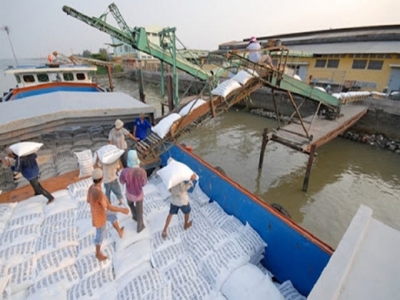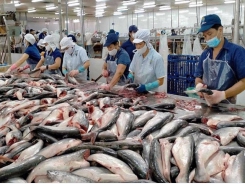Paradox - A ton of fertilizer is more expensive than a ton of rice

A massive crisis in fertilizer price is hitting the rice industry, which supplies food for half of the world's population. The fertilizer price is forecasted to suffer a sharp increase soon.
Prices of fertilizers have increased sharply due to the global energy crisis. Photo: BKP.
Rice prices will increase sharply due to increased input costs
A Bloomberg survey on conditions of rice farmers in Thailand-one of the world's top rice exporters, shows that the farmers are facing "exorbitant prices" of fertilizers in the upcoming crop.
Mr. Pramote Charoensilp, President of the Thailand Agricultural Association, an organization representing rice farmers, said that the cost of fertilizer in this country is on track to double since 2020. Specifically, the price of various types of fertilizer currently stands at an average of 16,000 baht ($480)/ton, a sharp increase compared to that of 10,000 baht/ton last year.
Thailand is currently among the world's third-largest exporters of agricultural products. “It will be a problem for rice farmers in the coming months. Many of them have already harvested the previous rice crop and are preparing to sow for the new one so they will need fertilizer. However, the irony is that a ton of fertilizer is now more expensive than a ton of rice,” Pramote said at an interview on Tuesday.
Rice is still a kind of staple food of many countries in Asia. According to experts, soaring fertilizer prices due to the global energy crisis will likely cause an increase in production costs in the regio. It is forecasted that in some countries, this could lead to forcing governments to step in an increase of subsidies for farmers to ensure food security and essential supplies.
Farmers are “hurt”
Like many other rice-producing countries, Thailand is now almost dependent on imported urea, phosphate and potassium fertilizers, mainly from China. Not only Thailand but also India, Pakistan and Southeast Asian countries are in a similar situation.
This makes farmers in this Southeast Asian country even more vulnerable while facing changes in the export policy of China-the world's second-largest economy, and the woes are warned to worsen since logistics costs are also high and the Chinese customs stepped up control on fertilizer exports due to concerns about the impact of rising prices on domestic food security from mid-October.
Mr. Pramote said that while the flood situation has been affecting most of Thailand's rice production, domestic enterprises still aim to export 6 million tons of rice this year.
"The cost of fertilizer will become a 'big problem' for farmers who are struggling with low prices for agricultural products. The government should intervene because the price of Thailand’s 5% broken white rice is now down about 30% from a peak in February," Mr. Pramote said.
According to Bloomberg, fertilizer costs are also causing impacts on other countries in Asia. The Crop Production Department under the Ministry of Agriculture and Rural Development of Vietnam said that it is encouraging rice farmers to cut the amount of fertilizer in half.
Meanwhile, in the Philippines, Wilfredo Roldan, General Director of the Fertilizer and Pesticide Administration, predicts that domestic rice and corn prices will have to increase sharply to offset costs because fertilizers account for 70% of the manufacturing cost.
Related news
Tools

Phối trộn thức ăn chăn nuôi

Pha dung dịch thủy canh

Định mức cho tôm ăn

Phối trộn phân bón NPK

Xác định tỷ lệ tôm sống

Chuyển đổi đơn vị phân bón

Xác định công suất sục khí

Chuyển đổi đơn vị tôm

Tính diện tích nhà kính

Tính thể tích ao




 Soybean foliar fertilizers - Worth the investment?
Soybean foliar fertilizers - Worth the investment?  A large-scale forum that connects agriculture in Hanoi…
A large-scale forum that connects agriculture in Hanoi…